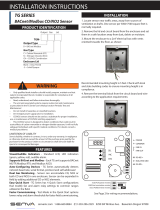
CARBON MONOXIDE/NITROGEN DIOXIDE GAS TRANSMITTERS
High Accuracy Electrochemical Sensor, Universal Output or BACnet or Modbus® Communication Protocol Options
The Series GSTA & GSTC Carbon Monoxide/Nitrogen Dioxide Gas Transmitters
monitor gas concentrations in mechanical rooms, underground parking garages and
loading docks. The carbon monoxide transmitter is used to measure the exhaust of
gasoline engines, while the nitrogen dioxide transmitter is used for diesel engines. The
Series GSTA features eld selectable current and voltage outputs while the Series
GSTC features BACnet or Modbus® communication protocol, allowing gas sensing
solutions that can be used with almost any building management controller.
BENEFITS/FEATURES
• Easy eld maintenance with industrial grade replaceable sensors
• Reduced inventory of units with eld selectable outputs
• Simplied setup for non-LCD units using the set-up display tool
APPLICATIONS
• Garage or loading dock ventilation
• Mechanical room monitoring
SPECIFICATIONS
Sensor: Field replaceable electrochemical, 4 years typical lifespan.
Range: NO2: 10 PPM; GSTA CO: Switch selectable 200 or 500 PPM; GSTC CO:
500 PPM.
Output Drift: <5% per year in air.
Coverage Area: 5000 to 7500 sq ft typical.
Accuracy: CO: 2% FS, NO2: 3% FS, at the time of calibration.
Resolution: CO: 1 PPM; NO2: 0.1 PPM.
Temperature Limits: -4 to 122°F (-20 to 50°C).
Storage Temperature: For best sensor life, 32 to 68°F (0 to 20°C).
Humidity Limits: 15 to 90% RH constant; 0 to 99% RH intermittent.
Response Time: <45 s to 90% CO, <25 s to 90% NO2.
Span and Zero Adjustment: Via onboard push-buttons or using optional A-449
display; GSTC models: Zero only via BACnet or Modbus® communication protocol.
Housing: UV resistant glass lled polycarbonate.
Output Signals: GSTA: Switch selectable 4-20 mA (loop powered), 0-5 V @ 5
mA, or 0-10 V @ 5 mA; Switch selectable 0-5 V/1-5 V and 0-10 V/2-10 V; Switch
selectable normal or reverse output; GSTC: BACnet MS/TP, Modbus® RTU, or
Modbus® ASCII (switch selectable) communication protocol.
Power Requirements: GSTA: Current output: 10-35 VDC, Voltage output: 15-35
VDC or 15-29 VAC; GSTC: 10-36 VDC or isolated 21.6-33 VAC, 5.7 mA @ 24 VDC.
Electrical Connection: Removable terminal block, knockouts for conduit tting.
Calibration: Via onboard push-buttons (LCD model only) or using optional A-449
display. Span gas concentration is eld selectable.
Enclosure Rating: IP64.
Weight: 1 lb (0.45 kg).
Agency Approvals: CE.
Wall mount
with LCD
Wall mount
without LCD
Duct mount
3-45/64
[94.06]
3-1/8
[107.95]
2-15/64
[56.75]
4-17/32
[115.09]
5-7/64
[129.78] 3-59/64
[100]
2-15/64
[57]
2-55/64
[73]
[85]
Duct mountWall mount
Modbus® is a registered trademark of Schneider Automation, Inc.
SERIES GSTA & GSTC
V
I
D
E
O
O
N
L
I
N
A-449A-GSTA-SE A-505 A-506 A-507
GCK-200CO-2000CO2
231
Gas Sensing
Transmitters
AIR QUALITY
DWYER INSTRUMENTS, INC. | dwyer-inst.com
MODEL CHART
Model Description
GSTA-C
GSTA-N
GSTA-C-LCD
GSTA-N-LCD
GSTA-C-D
GSTA-N-D
GSTC-C
GSTC-N
GSTC-C-LCD
GSTC-N-LCD
Carbon monoxide transmitter with universal current/voltage outputs
Nitrogen dioxide transmitter with universal current/voltage outputs
Carbon monoxie transmitter with universal current/voltage outputs,
LCD display
Nitrogen dioxide transmitter with universal current/voltage outputs,
LCD display
Carbon monoxide duct mount transmitter with universal current/
voltage outputs
Nitrogen dioxide duct mount transmitter with universal current/
voltage outputs
Carbon monoxide transmitter with BACnet and Modbus®
communication
Nitrogen dioxide transmitter with BACnet and Modbus®
communication
Carbon monoxide transmitter with BACnet and Modbus®
communication with integral LCD display
Nitrogen dioxide transmitter with BACnet and Modbus®
communication with integral LCD display
ACCESSORIES
Model Description
A-449
A-505
A-506
A-507
A-GSTA-SE
GCK-200CO-2000CO2
Remote LCD display
CO replacement sensor
NO2 replacement sensor
Calibration adaptor
Security enclosure
Calibration gas
YEAR LIMITED
WARRANTY




